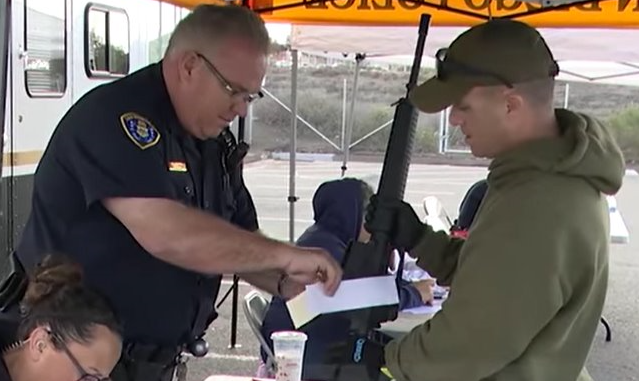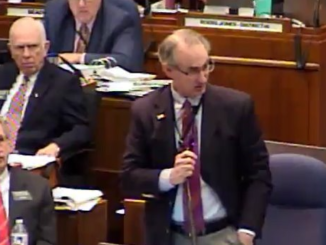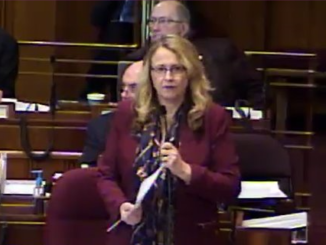
It appears the North Dakota State Legislature is going to have the opportunity to show just where it stands on gun buyback programs. The final touches were made with Legislative Council today on a bill sponsored by Rep. Luke Simons (R – District 36) that seeks to prohibit state agencies, political subdivisions, and law enforcement of the state from participating in the implementation, administration, or operation of a firearm buyback program.
If passed, the legislation would accomplish four things:
- It would establish a definition of “firearm buyback program” for a new section of the North Dakota Century Code. Not only does the definition include firearms, but it’s also broad enough to include firearm parts and ammunition. The definition is as follows:
As used in this section, ‘firearm buyback program’ means a program to purchase privately owned firearms, firearm parts, or ammunition from private individuals or organizations for the purpose of providing cash, gifts, or vouchers; or reducing the number of firearms, firearm parts, or ammunition owned by civilians; or permitting civilians to sell a firearm to the government without fear of prosecution. The term does not include the purchase of firearms, firearm parts, or ammunition from a licensed firearms dealer or a program to purchase firearms, firearm parts, or ammunition for law enforcement purposes.” - It would prohibit the state, political subdivisions, and law enforcement from participating in any gun buyback programs:
“A state agency, political subdivision, or any law enforcement agency of this state may not conduct a firearm buyback program or participate in the implementation, administration, or operation of a firearm buyback program.” - It would prohibit taxpayer dollars from being used for gun buyback programs:
“A state agency, political subdivision, or any law enforcement agency of this state may not expend any taxpayer dollars for the purpose of implementing, administering, or otherwise operating a firearm buyback program.” - It would establish a penalty clause:
“A violation of this section is a Class A misdemeanor.”
Undoubtedly, one of the arguments against the legislation will be that gun buybacks have not been an issue in North Dakota. But does that mean that we should wait until they are to respond? Oftentimes, leadership involves being proactive, not reactive. And I’d argue that given the current political climate across the country, now is the time to address the issue.
In case you’re not familiar with gun buyback programs, they’re used as something of an alternative to gun control in an effort to reduce the number of guns in society. Participants bring in guns and exchange them for cash, gifts (usually gift cards), or vouchers. The programs are typically conducted with the help of law enforcement and the guns are destroyed.
While at this point buybacks have not been carried out by means of force, some gun control advocates have suggested it’s time that change. For example, in May of last year, U.S. Representative Eric Swalwell (D – California) raised eyebrows when he expressed his view that it’s time to force those who own “assault weapons” to sell them or face prosecution. According to NBC News, Swalwell…
“… has proposed outlawing ‘military-style semiautomatic assault weapons’ and forcing existing owners to sell their weapons or face prosecution, a major departure from prior gun control proposals that typically exempt existing firearms.”
NBC further explains:
“Swalwell proposes that the government should offer up to $1,000 for every weapon covered by a new ban, estimating that it would take $15 billion to buy back roughly 15 million weapons — and ‘criminally prosecute any who choose to defy [the buyback] by keeping their weapons.'”
Now, obviously Swalwell is a U.S. Congressman and his idea is federal one. But the mere fact that we have elected representatives suggesting such a thing should be troubling to any American who believes in limited constitutional government and gun rights. And besides that, has North Dakota really been left untouched from those who would support these types of ideas on a state by state and city by city basis? I’d argue that it hasn’t been.
In the aftermath of the atrocious shooting at Stoneman Douglas High School in Parkland, Florida, in February of last year, a movement was born known as “March for Our Lives”. While their stated mission is to end gun violence, the means of achieving that is very much a gun control agenda. You might recall that some of the “Parkland survivors” and other activists associated with this movement came to Bismarck and Standing Rock last June. And if you look at the “Policy Agenda” on their website, you’ll see this under #5 “Limit firing power on the streets”:
“Weapons of war have no place in our communities. Our nation requires a comprehensive semi-automatic assault rifle ban that prohibits the future production and sale of these weapons and provides a solution for dealing with those semi-automatic assault rifles that are already owned, such as a buyback program or registration. Limiting high-powered weapons to the military has worked elsewhere to eliminate the opportunity for mass shootings.” (Emphasis Added)
These are the kids — and this is the movement — that came to North Dakota last year. So, let’s not pretend that we’re untouched by people with ideas like these.
And it’s not just some of the Parkland survivors that are advocating for such things. As you’ll see in this news report, just last September a Parkland parent organization known as 4FNOW sponsored a voluntary gun buyback program in Coral Springs, FL. According to their website, their main goal “is to remove unwanted, unneeded guns from our community.” And their hope is “that this would serve as a model organization for other communities across the US to adopt.”
As you can imagine, a number of buybacks have taken place across the country. But it should be noted that they’re found to be largely ineffective for accomplishing the purposes of those who advocate for them. For example, the Hopkins Center for Gun Policy and Research has found that gun buybacks do little to reduce rates of street crime. In 2013, their co-director Joe Vernick told NPR news:
“What we’ve learned is that high risk people don’t tend to participate. The folks who are at highest risk for being either a victim or a perpetrator of gun violence are young males. But disproportionately, the people who participate in these buybacks tend to be older; they tend to be female.”
Another interesting aspect of gun buybacks is that it’s entirely possible for participants to sell guns of lesser quality and then turn around and use the money towards purchasing a superior firearm.
But aside from all of this, perhaps one of the most compelling cases for passing this legislation is that it’s horribly inappropriate for taxpayer dollars to be used for such programs. In fact, you’ll notice in the wording of the bill that it prohibits the state, political subdivisions, and law enforcement from participating on two fronts. Not only can taxpayer dollars not be used “for the purpose of implementing, administering, or otherwise operating a firearm buyback program”, but they can’t participate in them at all.
This means that even if private individuals and/or organizations were to provide the cash, gifts, or vouchers themselves, the state, political subdivisions, and law enforcement would still be prohibited from participating. Why? It’s actually quite simple— because all of them are funded by the taxpayer. And utilizing taxpayer dollars for gun buyback programs is not a proper function of government. No more so than it would be to use taxpayer dollars to buy firearms for private individuals and organizations.
Would North Dakota be the first to pass such a prohibition? No. In fact, in 2014 then Governor Mike Pence signed a bill into law, for the State of Indiana, that contained a provision that prohibits taxpayer funded buybacks.
The time for the North Dakota State Legislature to take a stand against gun buyback programs is now, not later. It’s time to be proactive, not reactive. It’s time to draw a line in the sand and show the rest of the nation where we stand on this issue. And state lawmakers can do that by passing this bill.
Sources:
- https://www.legis.nd.gov/legislative-council
- https://www.nbcnews.com/politics/congress/dem-congressman-force-gun-owners-sell-assault-weapons-n871066
- https://marchforourlives.com/policy/
- https://www.kfyrtv.com/content/news/March-for-Our-Lives-and-Second-Amendment-rally-486897481.html
- https://www.sun-sentinel.com/local/broward/coral-springs/fl-cn-coral-springs-voluntary-gun-buyback-gift-cards-parkland-20180910-story.html
- http://4fnow.org/
- http://4fnow.org/4FMission.html
- https://www.nssf.org/gun-buybacks-ineffective-wastes-of-tax-dollars/
- https://www.npr.org/2013/01/12/169209919/gun-buyback-programs-tend-to-attract-low-risk-groups
- https://www.nraila.org/articles/20140327/indiana-governor-signs-pro-gun-legislation-into-law





